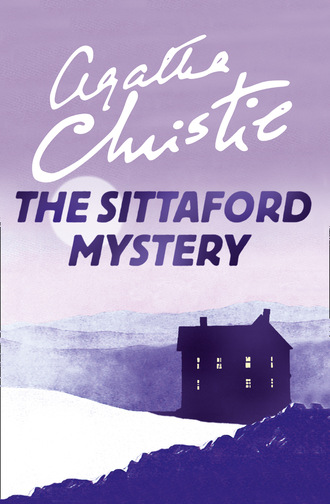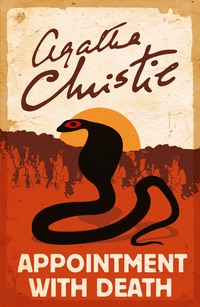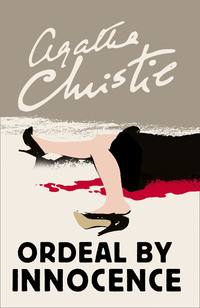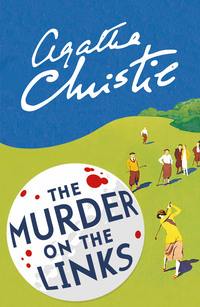
Полная версия
Everyone was embarrassed. A sudden blight had come over the cheerful party.
Major Burnaby pushed back his chair, went to the window and pulled aside the curtain. He stood there looking out with his back to the room.
‘Twenty-five minutes past five,’ said Mr Rycroft glancing up at the clock. He compared it with his own watch and somehow everyone felt the action was significant in some way.
‘Let me see,’ said Mrs Willett with forced cheerfulness. ‘I think we’d better have cocktails. Will you ring the bell, Mr Garfield?’
Ronnie obeyed.
Ingredients for cocktails were brought and Ronnie was appointed mixer. The situation grew a little easier.
‘Well,’ said Ronnie, raising his glass. ‘Here’s how.’
The others responded—all but the silent figure by the window.
‘Major Burnaby. Here’s your cocktail.’
The Major roused himself with a start. He turned slowly.
‘Thank you, Mrs Willett. Not for me.’ He looked once more out into the night, then came slowly back to the group by the fire. ‘Many thanks for a very pleasant time. Good night.’
‘You’re not going?’
‘Afraid I must.’
‘Not so soon. And on a night like this.’
‘Sorry, Mrs Willett—but it’s got to be done. If there were only a telephone.’
‘A telephone?’
‘Yes—to tell you the truth—I’m—well. I’d like to be sure that Joe Trevelyan’s all right. Silly superstition and all that—but there it is. Naturally, I don’t believe in this tommy rot—but—’
‘But you can’t telephone from anywhere. There’s not such a thing in Sittaford.’
‘That’s just it. As I can’t telephone, I’ll have to go.’
‘Go—but you couldn’t get a car down that road! Elmer wouldn’t take his car out on such a night.’
Elmer was the proprietor of the sole car in the place, an aged Ford, hired at a handsome price by those who wished to go into Exhampton.
‘No, no—car’s out of the question. My two legs will take me there, Mrs Willett.’
There was a chorus of protest.
‘Oh! Major Burnaby—it’s impossible. You said yourself it was going to snow.’
‘Not for an hour—perhaps longer. I’ll get there, never fear.’
‘Oh! you can’t. We can’t allow it.’
She was seriously disturbed and upset.
But argument and entreaty had no more effect on Major Burnaby than if he were a rock. He was an obstinate man. Once his mind was made up on any point, no power on earth could move him.
He had determined to walk to Exhampton and see for himself that all was well with his old friend, and he repeated that simple statement half a dozen times.
In the end they were brought to realize that he meant it. He wrapped himself up in his overcoat, lighted the hurricane lantern, and stepped out into the night.
‘I’ll just drop in to my place for a flask,’ he said cheerily, ‘and then push straight on. Trevelyan will put me up for the night when I get there. Ridiculous fuss, I know. Everything sure to be all right. Don’t worry, Mrs Willett. Snow or no snow—I’ll get there in a couple of hours. Good night.’
He strode away. The others returned to the fire.
Rycroft had looked up at the sky.
‘It is going to snow,’ he murmured to Mr Duke. ‘And it will begin long before he gets to Exhampton. I—I hope he gets there all right.’
Duke frowned.
‘I know. I feel I ought to have gone with him. One of us ought to have done so.’
‘Most distressing,’ Mrs Willett was saying, ‘most distressing. Violet, I will not have that silly game ever played again. Poor Major Burnaby will probably plunge into a snowdrift—or if he doesn’t he’ll die of the cold and exposure. At his age, too. Very foolish of him to go off like that. Of course, Captain Trevelyan is perfectly all right.’
Everyone echoed:
‘Of course.’
But even now they did not feel really too comfortable.
Supposing something had happened to Captain Trevelyan…
Supposing…
Chapter 3
Five and Twenty Past Five
Two and a half hours later, just before eight o’clock, Major Burnaby, hurricane lantern in hand, his head dropped forward so as not to meet the blinding drive of snow, stumbled up the path to the door of ‘Hazelmoor’, the small house tenanted by Captain Trevelyan.
The snow had begun to fall about an hour ago—great blinding flakes of it. Major Burnaby was gasping, emitting the loud sighing gasps of an utterly exhausted man. He was numbed with cold. He stamped his feet, blew, puffed, snorted and applied a numbed finger to the bell push.
The bell trilled shrilly.
Burnaby waited. After a pause of a few minutes, as nothing happened, he pushed the bell again.
Once more there was no stir of life.
Burnaby rang a third time. This time he kept his finger on the bell.
It trilled on and on—but there was still no sign of life in the house.
There was a knocker on the door. Major Burnaby seized it and worked it vigorously, producing a noise like thunder.
And still the little house remained silent as the dead.
The Major desisted. He stood for a moment as though perplexed—then he slowly went down the path and out at the gate, continuing on the road he had come towards Exhampton. A hundred yards brought him to the small police station.
He hesitated again, then finally made up his mind and entered.
Constable Graves, who knew the Major well, rose in astonishment.
‘Well, I never, sir, fancy you being out on a night like this.’
‘Look here,’ said Burnaby curtly. ‘I’ve been ringing and knocking at the Captain’s house and I can’t get any answer.’
‘Why, of course, it’s Friday,’ said Graves who knew the habits of the two pretty well. ‘But you don’t mean to say you’ve actually come down from Sittaford on a night like this? Surely the Captain would never expect you.’
‘Whether he’s expected me or not, I’ve come,’ said Burnaby testily. ‘And as I’m telling you, I can’t get in. I’ve rung and knocked and nobody answers.’
Some of his uneasiness seemed to communicate itself to the policeman.
‘That’s odd,’ he said, frowning.
‘Of course, it’s odd,’ said Burnaby.
‘It’s not as though he’s likely to be out—on a night like this.’
‘Of course he’s not likely to be out.’
‘It is odd,’ said Graves again.
Burnaby displayed impatience at the man’s slowness.
‘Aren’t you going to do something?’ he snapped.
‘Do something?’
‘Yes, do something.’
The policeman ruminated.
‘Think he might have been taken bad?’ His face brightened. ‘I’ll try the telephone.’ It stood at his elbow. He took it up and gave the number.
But to the telephone, as to the front door bell, Captain Trevelyan gave no reply.
‘Looks as though he has been taken bad,’ said Graves as he replaced the receiver. ‘And all alone in the house, too. We’d best got hold of Dr Warren and take him along with us.’
Dr Warren’s house was almost next door to the police station. The doctor was just sitting down to dinner with his wife and was not best pleased at the summons. However, he grudgingly agreed to accompany them, drawing on an aged British Warm and a pair of rubber boots and muffling his neck with a knitted scarf.
The snow was still falling.
‘Damnable night,’ murmured the doctor. ‘Hope you haven’t brought me out on a wild goose chase. Trevelyan’s as strong as a horse. Never has anything the matter with him.’
Burnaby did not reply.
Arriving at Hazelmoor once more, they rang again and knocked, but elicited no response.
The doctor then suggested going round the house to one of the back windows.
‘Easier to force than the door.’
Graves agreeing, they went round the back. There was a side door which they tried on the way, but it too was locked, and presently they emerged on the snow-covered lawn that led up to the back windows. Suddenly, Warren uttered an exclamation.
‘The window of the study—it’s open.’
True enough, the window, a French one, was standing ajar. They quickened their steps. On a night like this, no one in his senses would open a window. There was a light in the room that streamed out in a thin yellow band.
The three men arrived simultaneously at the window—Burnaby was the first man to enter, the constable hard on his heels.
They both stopped dead inside and something like a muffled cry came from the ex-soldier. In another moment Warren was beside them, and saw what they had seen.
Captain Trevelyan lay on the floor, face downwards. His arms sprawled widely. The room was in confusion—drawers of the bureau pulled out, papers lying about the floor. The window beside them was splintered where it had been forced near the lock. Beside Captain Trevelyan was a dark green baize tube about two inches in diameter.
Warren sprang forward. He knelt down by the prostrate figure.
One minute sufficed. He rose to his feet, his face pale.
‘He’s dead?’ asked Burnaby.
The doctor nodded.
Then he turned to Graves.
‘It’s for you to say what’s to be done. I can do nothing except examine the body and perhaps you’d rather I didn’t do that until the Inspector comes. I can tell you the cause of death now. Fracture of the base of the skull. And I think I can make a guess at the weapon.’
He indicated the green baize tube.
‘Trevelyan always had them along the bottom of the door—to keep the draught out,’ said Burnaby.
His voice was hoarse.
‘Yes—a very efficient form of sandbag.’
‘My God!’
‘But this here—’ the constable broke in, his wits arriving at the point slowly. ‘You mean—this here is murder.’
The policeman stepped to the table on which stood a telephone.
Major Burnaby approached the doctor.
‘Have you any idea,’ he said, breathing hard, ‘how long he’s been dead?’
‘About two hours, I should say, or possibly three. That’s a rough estimate.’
Burnaby passed his tongue over dry lips.
‘Would you say,’ he asked, ‘that he might have been killed at five twenty-five?’
The doctor looked at him curiously.
‘If I had to give a time definitely, that’s just about the time I would suggest.’
‘Oh my God,’ said Burnaby.
Warren stared at him.
The Major felt his way blindly to a chair, collapsed on to it and muttered to himself whilst a kind of staring terror overspread his face.
‘Five and twenty past five—Oh my God, then it was true after all.’
Chapter 4
Inspector Narracott
It was the morning after the tragedy, and two men were standing in the little study of Hazelmoor.
Inspector Narracott looked round him. A little frown appeared upon his forehead.
‘Ye-es,’ he said thoughtfully. ‘Ye-es.’
Inspector Narracott was a very efficient officer. He had a quiet persistence, a logical mind and a keen attention to detail which brought him success where many another man might have failed.
He was a tall man with a quiet manner, rather far-away grey eyes, and a slow soft Devonshire voice.
Summoned from Exeter to take charge of the case, he had arrived on the first train that morning. The roads had been impassable for cars, even with chains, otherwise he would have arrived the night before. He was standing now in Captain Trevelyan’s study having just completed his examination of the room. With him was Sergeant Pollock of the Exhampton police.
‘Ye-es,’ said Inspector Narracott.
A ray of pale wintry sunshine came in through the window. Outside was the snowy landscape. There was a fence about a hundred yards from the window and beyond it the steep ascending slope of the snow-covered hillside.
Inspector Narracott bent once more over the body which had been left for his inspection. An athletic man himself, he recognized the athlete’s type, the broad shoulders, narrow flanks, and the good muscular development. The head was small and well set on the shoulders, and the pointed naval beard was carefully trimmed. Captain Trevelyan’s age, he had ascertained, was sixty, but he looked not much more than fifty-one or two.
‘Ah!’ said Sergeant Pollock.
The other turned on him.
‘What is your view of it?’
‘Well—’ Sergeant Pollock scratched his head. He was a cautious man, unwilling to advance further than necessary.
‘Well,’ he said, ‘as I see it, sir, I should say that the man came to the window, forced the lock, and started rifling the room. Captain Trevelyan, I suppose, must have been upstairs. Doubtless the burglar thought the house was empty—’
‘Where is Captain Trevelyan’s bedroom situated?’
‘Upstairs, sir. Over this room.’
‘At the present time of year it is dark at four o’clock. If Captain Trevelyan was up in his bedroom the electric light would have been on, the burglar would have seen it as he approached this window.’
‘You mean he’d have waited.’
‘No man in his senses would break into a house with a light in it. If anyone forced this window—he did it because he thought the house was empty.’
Sergeant Pollock scratched his head.
‘Seems a bit odd, I admit. But there it is.’
‘We’ll let it pass for the moment. Go on.’
‘Well, suppose the Captain hears a noise downstairs. He comes down to investigate. The burglar hears him coming. He snatches up that bolster arrangement, gets behind the door, and as the Captain enters the room strikes him down from behind.’
Inspector Narracott nodded.
‘Yes, that’s true enough. He was struck down when he was facing the window. But all the same, Pollock, I don’t like it.’
‘No, sir?’
‘No, as I say, I don’t believe in houses that are broken into at five o’clock in the afternoon.’
‘We-ell, he may have thought it a good opportunity—’
‘It is not a question of opportunity—slipping in because he found a window unlatched. It was deliberate house-breaking—look at the confusion everywhere—what would a burglar go for first? The pantry where the silver is kept.’
‘That’s true enough,’ admitted the Sergeant.
‘And this confusion—this chaos,’ continued Narracott, ‘these drawers pulled out and their contents scattered. Pah! It’s bunkum.’
‘Bunkum?’
‘Look at the window, Sergeant. That window was not locked and forced open! It was merely shut and then splintered from the outside to give the appearance of forcing.’
Pollock examined the latch of the window closely, uttering an ejaculation to himself as he did so.
‘You are right, sir,’ he said with respect in his voice. ‘Who’d have thought of that now!’
‘Someone who wishes to throw dust in our eyes—and hasn’t succeeded.’
Sergeant Pollock was grateful for the ‘our’. In such small ways did Inspector Narracott endear himself to his subordinates.
‘Then it wasn’t burglary. You mean, sir, it was an inside job.’
Inspector Narracott nodded. ‘Yes,’ he said. ‘The only curious thing is, though, that I think the murderer did actually enter by the window. As you and Graves reported, and as I can still see for myself, there are damp patches still visible where the snow melted and was trodden in by the murderer’s boots. These damp patches are only in this room. Constable Graves was quite positive that there was nothing of the kind in the hall when he and Dr Warren passed through it. In this room he noticed them immediately. In that case it seems clear that the murderer was admitted by Captain Trevelyan through the window. Therefore it must have been someone whom Captain Trevelyan knew. You are a local man, Sergeant, can you tell me if Captain Trevelyan was a man who made enemies easily?’
‘No, sir, I should say he hadn’t an enemy in the world. A bit keen on money, and a bit of a martinet—wouldn’t stand for any slackness or incivility—but bless my soul, he was respected for that.’
‘No enemies,’ said Narracott thoughtfully.
‘Not here, that is.’
‘Very true—we don’t know what enemies he may have made during his naval career. It’s my experience, Sergeant, that a man who makes enemies in one place will make them in another, but I agree that we can’t put that possibility entirely aside. We come logically now to the next motive—the most common motive for every crime—gain. Captain Trevelyan was, I understand, a rich man?’
‘Very warm indeed by all accounts. But close. Not an easy man to touch for a subscription.’
‘Ah!’ said Narracott thoughtfully.
‘Pity it snowed as it did,’ said the Sergeant. ‘But for that we’d have had his footprints as something to go on.’
‘There was no one else in the house?’ asked the Inspector.
‘No. For the last five years Captain Trevelyan has only had one servant—retired naval chap. Up at Sittaford House a woman came in daily, but this chap, Evans, cooked and looked after his master. About a month ago he got married—much to the Captain’s annoyance. I believe that’s one of the reasons he let Sittaford House to this South African lady. He wouldn’t have any woman living in the house. Evans lives just round the corner here in Fore Street with his wife, and comes in daily to do for his master. I’ve got him here now for you to see. His statement is that he left here at half past two yesterday afternoon, the Captain having no further need for him.’
‘Yes, I shall want to see him. He may be able to tell us something—useful.’
Sergeant Pollock looked at his superior officer curiously. There was something so odd about his tone.
‘You think—’ he began.
‘I think,’ said Inspector Narracott deliberately, ‘that there’s a lot more in this case than meets the eye.’
‘In what way, sir?’
But the Inspector refused to be drawn.
‘You say this man, Evans, is here now?’
‘He’s waiting in the dining-room.’
‘Good. I’ll see him straight away. What sort of a fellow is he?’
Sergeant Pollock was better at reporting facts than at descriptive accuracy.
‘He’s a retired naval chap. Ugly customer in a scrap, I should say.’
‘Does he drink?’
‘Never been the worse for it that I know of.’
‘What about this wife of his? Not a fancy of the Captain’s or anything of that sort?’
‘Oh! no, sir, nothing of that kind about Captain Trevelyan. He wasn’t that kind at all. He was known as a woman hater, if anything.’
‘And Evans was supposed to be devoted to his master?’
‘That’s the general idea, sir, and I think it would be known if he wasn’t. Exhampton’s a small place.’
Inspector Narracott nodded.
‘Well,’ he said, ‘there’s nothing more to be seen here. I’ll interview Evans and I’ll take a look at the rest of the house and after that we will go over to the Three Crowns and see this Major Burnaby. That remark of his about the time was curious. Twenty-five past five, eh? He must know something he hasn’t told, or why should he suggest the time of the crime so accurately?’
The two men moved towards the door.
‘It’s a rum business,’ said Sergeant Pollock, his eye wandering to the littered floor. ‘All this burglary fake!’
‘It’s not that that strikes me as odd,’ said Narracott, ‘under the circumstances it was probably the natural thing to do. No—what strikes me as odd is the window.’
‘The window, sir?’
‘Yes. Why should the murderer go to the window? Assuming it was someone Trevelyan knew and admitted without question, why not go to the front door? To get round to this window from the road on a night like last night would have been a difficult and unpleasant proceeding with the snow lying as thick as it does. Yet there must have been some reason.’
‘Perhaps,’ suggested Pollock, ‘the man didn’t want to be seen turning in to the house from the road.’
‘There wouldn’t be many people about yesterday afternoon to see him. Nobody who could help it was out of doors. No—there’s some other reason. Well, perhaps it will come to light in due course.’
Chapter 5
Evans
They found Evans waiting in the dining-room. He rose respectfully on their entrance.
He was a short thick-set man. He had very long arms and a habit of standing with his hands half clenched. He was clean shaven with small, rather piglike eyes, yet he had a look of cheerfulness and efficiency that redeemed his bulldog appearance.
Inspector Narracott mentally tabulated his impressions.
‘Intelligent. Shrewd and practical. Looks rattled.’
Then he spoke:
‘You’re Evans, eh?’
‘Yes, sir.’
‘Christian names?’
‘Robert Henry.’
‘Ah! Now what do you know about this business?’
‘Not a thing, sir. It’s fair knocked me over. To think of the Capting being done in!’
‘When did you last see your master?’
‘Two o’clock I should say it was, sir. I cleared away the lunch things and laid the table here as you see for supper. The Capting, he told me as I needn’t come back.’
‘What do you usually do?’
‘As a general rule, I come back about seven for a couple of hours. Not always—sometimes the Capting would say as I needn’t.’
‘Then you weren’t surprised when he told you that yesterday you wouldn’t be wanted again?’
‘No, sir. I didn’t come back the evening before either—on account of the weather. Very considerate gentleman, the Capting was, as long as you didn’t try to shirk things. I knew him and his ways pretty well.’
‘What exactly did he say?’
‘Well, he looked out of the window and he says, “Not a hope of Burnaby today”. “Shouldn’t wonder,” he says, “if Sittaford isn’t cut off altogether. Don’t remember such a winter since I was a boy.” That was his friend Major Burnaby over to Sittaford that he was referring to. Always comes on a Friday, he does, he and the Capting play chess and do acrostics. And on Tuesdays the Capting would go to Major Burnaby’s. Very regular in his habits was the Capting. Then he said to me: “You can go now, Evans, and you needn’t come till tomorrow morning.” ’
‘Apart from his reference to Major Burnaby, he didn’t speak of expecting anyone that afternoon?’
‘No, sir, not a word.’
‘There was nothing unusual or different in any way in his manner?’
‘No, sir, not that I could see.’
‘Ah! Now I understand, Evans, that you have lately got married.’
‘Yes, sir. Mrs Belling’s daughter at the Three Crowns. Matter of two months ago, sir.’
‘And Captain Trevelyan was not overpleased about it.’
A very faint grin appeared for a moment on Evans’s face.
‘Cut up rough about it, he did, the Capting. My Rebecca is a fine girl, sir, and a very good cook. And I hoped we might have been able to do for the Capting together, but he—he wouldn’t hear of it. Said he wouldn’t have women servants about his house. In fact, sir, things were rather at a deadlock when this South African lady came along and wanted to take Sittaford House for the winter. The Capting he rented this place, I came in to do for him every day, and I don’t mind telling you, sir, that I had been hoping that by the end of the winter the Capting would have come round to the idea; and that me and Rebecca would go back to Sittaford with him. Why, he would never even know she was in the house. She would keep to the kitchen, and she would manage so that he would never meet her on the stairs.’
‘Have you any idea what lay behind Captain Trevelyan’s dislike of women?’
‘Nothing to it, sir. Just an ’abit, sir, that’s all. I have seen many a gentleman like it before. If you ask me, it’s nothing more or less than shyness. Some young lady or other gives them a snub when they are young—and they gets the ’abit.’
‘Captain Trevelyan was not married?’
‘No, indeed, sir.’
‘What relations had he? Do you know?’
‘I believe he had a sister living at Exeter, sir, and I think I have heard him mention a nephew or nephews.’









